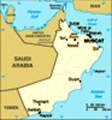Advertisement
Published: June 22nd 2019
We’re tired, in the wrong time zone, and the weather app says that the temperature “feels like” 43, so we decide to spend most of the day relaxing by the pool and on the beach. As I make my way out of the sea up onto the sand, it’s a bit hard not to notice a crab the size of a small dog. I suspect it wouldn’t have too much trouble chomping off one of my feet with a single snap of one of its gigantic claws, so I decide that maybe that’s enough swimming in the sea for today.
I take the opportunity to read up on the history of Muscat. The ever reliable Wikipedia tells us that there’s evidence of a settlement here from as early as 6,000 BC, and it seems that the town has been an important and strategically located trading port for several thousand years. As seems to have been inevitable for anywhere of strategic importance, the Europeans eventually decided to get in on the act, and in 1507 the Portuguese turned up and tried to establish local trade relations. The Omanis weren’t too happy about this and fired on the Portuguese fleet, which responded
by invading Muscat town and burning it to the ground. I’ve never been all that sure of the logic of invading somewhere and then destroying it, particularly if there’s only desert left after you’ve burnt all the buildings, but who am I to argue with hundreds of years of colonial wisdom. The Portuguese then controlled Muscat for around 100 years, interspersed by two brief periods when the Turks managed to dislodge them, before the locals eventually managed to get rid of them for good in 1650. The Al Bu Sa’id Dynasty has ruled Muscat ever since. It called on the British at various times in the late nineteenth and early twentieth centuries to assist in quelling rebellions by groups from the country’s interior, before the current Sultan Qaboos bin Sa’id overthrew his father in a bloodless coup in 1970. He’s ruled Oman since that time, which apparently makes him the world’s third longest serving monarch, and the longest serving monarch in the Middle East. I wonder how family get togethers go after you’ve overthrown your father as the ruler of a country.
The Sultan then embarked on a program of economic reforms with increased spending on health, welfare and
education. A 2010 UN report noted that on the basis of economic development in the preceding 40 years, Oman was the most improved country in the world. Perhaps unsurprisingly the Sultan is an absolute monarch who rules by decree, and it’s illegal to criticise him. I suspect that I might need to be a bit careful about what I write here. I hope that stating that it’s illegal to criticise the Sultan can’t in itself be construed as criticism, and that I don’t get arrested at the airport when we try to leave. This is all a bit different to back home, where I sometimes wonder if it’s illegal to not criticise the government.
Muscat’s current population is around 1.4 million, and if first impressions are anything to go by it’s far from the small sleepy backwater town that we’d probably been expecting.
We’re reminded that we’re in Islamic Oman by our lunchtime waiter, who tells us that because it’s Friday they’re not allowed to serve us any alcohol until after 2pm. Sale and consumption of alcohol is banned completely during Ramadan, and whilst some here want it banned permanently, others argue that this would harm the country’s
burgeoning tourist industry. Alcohol is generally only available at tourist hotels and a limited number of other restaurants, and if you want to drink alcohol at home here you need to apply to the police for a licence. I wonder if you’re allowed to apply if you’re a Muslim.
We take a late afternoon taxi ride into the old Muscat port area of Mutrah. Our taxi driver introduces himself as Suleiman. He tells us that he is Omani born and bred and that he has eight children. We tell him that he is very lucky, but he says that he is just crazy. He tells us that the extensive areas of lush greenery along the sides of the roads here are all irrigated with recycled water. I think the rest of the world could learn a lot from this. He is also very proud to tell us that Omani roads have been rated the third best in the world. I’m not quite sure where he’s getting his information from, but I do see that a recent World Economic Forum report did indeed rate Oman a very creditable fourteenth in the world’s best roads rankings, which puts it just slightly
ahead of Germany. Last on the list is Mauritania, so that might be a country best avoided for driving holidays.
The scenery along the Mutrah waterfront is stunning. The boulevard and buildings are all set against a backdrop of steep rugged rocky hills completely devoid of any vegetation. Mutrah Fort, which was built by the Portuguese in the 1580s, sits atop one of the hills at the south end of the harbour. We wander back and forth along the waterfront and then into the maze of alleyways that make up Mutrah Souq, where it seems you can buy a vast array of just about anything, with a strong emphasis on jewellery, gold and silver, clothes and souvenirs. If the number of traders trying to stuff frankincense up our noses as we walk by is anything to go by, this is also a very popular offering. We eat on the second floor balcony of a local restaurant recommended to us by Suleiman. The food is excellent, as is the view out over the waterfront.
Advertisement
Tot: 0.081s; Tpl: 0.014s; cc: 11; qc: 18; dbt: 0.0595s; 1; m:domysql w:travelblog (10.17.0.13); sld: 1;
; mem: 1.1mb













